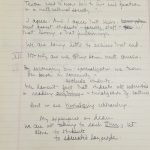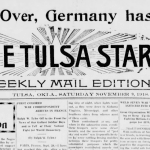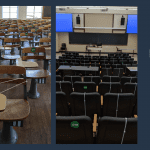On May 20, 2011, the UT Department of History was pleased to welcome one of our most illustrious graduates to deliver this year’s Commencement Address. Renowned trial lawyer and generous UT supporter, Joe Jamail (JD 1953, BA History, 1950), treated graduates and their families to his thoughts on the ways that studying History at UT made him the lawyer he became. We are publishing the entire speech for all our readers here because it exemplifies our belief in the value of studying History, as well as our belief that “the past is never dead.”
“You are very fortunate to have been able to study History. So was I. History does more than tell us about the past. It shows us the way to have a wider view of the world. We cannot possibly understand the present without a knowledge of the past.
The record of pre-historic times.
The record of pre-civilization.
The record of civilization.
The record of human and pre-human ancestors and their exploits and progress.
History presents the major records from around the world in a manner that preserves their appeal as fine literature.
History reflects human nature, with its needs and desires, hopes and fears.
History satisfies the need to have roots.
History is not a narrow view of all things but it is the one educational tool that reveals the different ways in which human beings respond to the issues that unite them.
The study of world history leads us to gain insight into ourselves and to evaluate the nature of our own lives and the events that occur. Like the heroes of every culture, all people today confront choices that force them to reconcile their personal wishes with their responsibility to others. Like these heroic figures, all people today must confront tasks in the course of their daily lives that appear to be insurmountable. They, too, must be courageous and determined if they are to achieve their goals. The study of the hero teaches that great character is as important as great deeds.
History continues to inspire many creative and intellectual pursuits. It enriches the appreciation of literature, art, and music and can lead to greater interest in all things.
History has been a very large role in my life. It not only has brought me great pleasure, it taught me and enabled me to be a very good lawyer.
Because of my fascination with history as a student and up to today, I was able to use it to better understand and explain to courts and juries the reasons for my presentation.
How is this so? It is because life is a continuing process. Not an isolated incident. What we are is a continuing process of all that went before us.
The legal system of the Western world rests on a large body of philosophical, social and literary history. It is important for students to learn that history so they can be people of understanding, breadth and learning. It is important for them to recognize that our system of law and justice grew out of our own past; and that we are trustees and not owners of that past, including our laws and institutions. Perhaps the best thing we might do to improve the society would be to launch a crusade to improve the liberal arts education. They should be encouraged to take courses in science, history, literature, philosophy and psychiatry as part of their training.
The legal profession has always been criticized, condemned and cursed but let me give you another view.
Other professions erect buildings that fall down, bridges that wash out, planes and ships that rust into obsolescence. Even the steel of sacred symbols like our Statue of Liberty wore out in one hundred years.
We don’t build with steel or stone, but with sturdier stuff. We build monuments with ideas and principles based on History.
Homer never built of rock or steel, nor did Socrates, nor did Jesus, nor Moses. They built with more enduring stuff – ideas and inspirations – beauty and truth.
We know this because it is part of our History.
Knowing the history of law, its beginnings and growth and the history of great lawyers and how they related to problems gave me an advantage over those who were not well versed in history.
Let me tell you about a very important part of our lives, we learned from a lesson of fact recorded in History. This is what history tells us. It proves once again that history is entwined in every important event that profoundly affects our lives.
It is August 14, 1670.
History tells us the story of William Penn and the jury system that protects us. This would never be known if it had not been recorded, preserved forever to teach us. Penn had been charged with treason for preaching peace. He was a Quaker. The war-like king didn’t like it – they tried him.
It is critical because it truly defined the rights of people and it was the landmark moment for freedom.
Not only for the jury system but for our own freedom of speech, religion, and the rest of our freedoms
In the Penn case the leader of that great, courageous group of jurors was not a lawyer, but a student of history. He knew and understood the “Magna Carta”. That historical document that ensured Jury trials in England and later in America. They challenged the judge and established the Jury system. A lawyer named Andrew Hamilton years later was called on to defend a small pamphlet published by Peter Zenger. Andrew Hamilton had been a young boy in the English courtroom during the Penn case. He remembered. Before we were the United States, still under Britain, using that history, he convinced the jury to find Zenger not guilty of treason by publishing a paper criticizing the Crown. Lawyer Hamilton convinced the jury that they had a more moral and higher responsibility than the command of the king’s appointed judge. The jury agreed and found Peter Zenger innocent and history recorded then tells us that established free press in US.
History was the most important ingredient in establishing our freedoms. England’s freedom.
That is why we now have embedded in our law – Freedom of Speech, Freedom of the Press, Freedom of Religion.
In many cases I have tried, I have used the history of William Penn to illustrate the independence of the jury and to remind them of courage.
I believe it is the most significant legal case of the last thousand years. It wasn’t the Scopes Monkey trial. It wasn’t Brown v Board of Education, although the Warren court’s opinion changed the face of American society forever. It wasn’t Pennzoil v. Texaco, that I tried – the largest jury verdict at the time in the history of the law. It was upheld and changed the way corporate American conducts its affairs in the mergers and acquisitions field. The answer, I believe, was a case involving the arrest of a young man more than 330 years ago.
It was August 14, 1670, a Sunday. A congregation comes to their church in London, intent on peaceful worship. Their church is barred by heavy iron bars and chains. Soldiers guard the entrance. The soldiers are determined to deny the worshipers access to their church. The claim was these people were dangerous to King Charles II and decided to close it down. His father Charles I was executed by Cromwell. Charles II now reigns with power far greater than that for which his father had been put to death.
This congregation were Quakers who believed in love, friendship and universal brotherhood. More importantly, they were pacifists who believe that war is wrong. Such teachings represent a threat to the despot expanding his empire or authority, by use of force.
The young leader of the Quakers made his way through the crowd and confronted the captain.
“Friend,” he says, “we beg of you as men of peace to stand aside and allow us to open the house of our Lord that we may properly honor and worship.”
“We gather in peace and we are determined to honor our Lord upon His day, and will not return home until we have done so.”
The young man is familiar to all of us. He was William Penn.
Since the church is barred, Penn declares that they will have their service in front of the meeting house.
Penn is charged with preaching treason. The criminal trial under law requires a jury of lay citizens. Impaneling a jury then is a simple matter. Constables arrest people at random off the streets.
Edward Bushell is one of the twelve men brought to the courtroom in the Old Bailey to sit judgment of Penn. He was the leader in the jury room. The man I spoke of earlier. He was not a lawyer. He was a history enthusiast. He had read and had with him a copy of that great historical document, The Magna Carta.
Penn tries to offer a defense. What the Quakers were doing is not illegal. For the prosecution, Alderman Browne interrupts, “You are not here for worshiping God but
for breaking the law.”
After the third witness testifies that he saw Penn preaching but could not hear what he was saying, the court instructs the jury to retire to the jury room and deliberate its verdict. The men elect Thomas Veer as foreman. After a short deliberation, Bushell argues innocence, relying on a copy of the Magna Carta he has in his pocket. They have deliberated a little over an hour and thirty minutes when the bailiff knocks on the door. He tells the twelve that the court is growing impatient with their delay and “order you to come below at once.” Bushell replies that since the jury has no verdict, they cannot come. Eight of the jurors leave the jury room and take their seats in the box. Four others, including Bushell and Veer, remain. Within a short time the bailiffs are pounding on the door again, demanding that the four follow them down to the Court.
The Judges say, “If the jury does not show respect for this Court, you shall all be fined and denied your dinners. You will have your noses slit and tongues cut out.”
They wait for the bailiff. At 9:30 they are back in court. The Mayor again demands the verdict and asks who will speak for the jury. He is told, “Our foreman, Thomas Veer.” Veer rises. The courtroom is quiet and still. He hands the paper to the clerk who recites that the jurors have found Penn guilty of speaking to an assembly on August 14, 1670. No treason.
“Will you be led by such a silly fellow as Bushell?”, screams Judge Starling. Judge Howell tells them that the court will not accept the verdict. They will be locked up, without meat, drink, fire and tobacco. “We will have a verdict by the help of God, or you will starve for it.”
Bushell rises to address the Court. He reminds them that the jurors are to abide by their oaths and find according to evidence. There is no power in the Magna Carta to dictate the jury’s verdict. The Lord Mayor replies,”This Court has any power it chooses.” Bushell again tries to argue the rights of the Magna Carta.
The Judge says, “These rights will starve you.”
The jury is back. The court inquires whether the jurors agreed. They all respond in a defiant tone that they are. The court asks who will announce the verdict. The twelve men shout, “Our foreman, Thomas Veer.” The court calls for the verdict. “Is William Penn not guilty or guilty?” Veer musters what little strength he has. He speaks but two words, “Not guilty.”
“You say William Penn is not guilty in manner and form as he stands indicted and so say you all?”
The jurors reply, “We do!” The court polls the jury. Each juror answers to his name and takes responsibility for the verdict. Bushell stands up. “My Lords, as the jury has now delivered its verdict and it is recorded, we asked to be released with all deliberate speed as we are all in great want.” The court refused to excuse them. Instead, for their actions you are each fined forty marks and imprisonment until paid.” Bushell argues with the court that they jury has performed its duty in good conscience and has undergone a heavy ordeal. He reminds them that the laws of England require that they be released at once.
“Pay your fines and you shall be discharged. Until you do, you will be taken to Newgate Prison with William Penn, there to remain until your fines are paid.”
Foreman Veers’ daughter can hold back no longer. She descends to the pit, berating the judges. She opens her purse and takes out some coins. Others in the audience come up to help her with the fine. She flings the coins on the clerk’s desk. Veer speaks feebly. “No daughter, don’t pay it. Let me die in prison than yield to them.” Veer, with his daughter holding him announces again, “not guilty.” Then, he falls to the floor of the courtroom and dies.
The jurors and William Penn are taken to prison. Days later a lawyer who heard of it appears. One of the six carrying Veers from the courtroom is a fourteen year old boy, Andrew Hamilton. He will carry the memory of the trial all his life. He comes to America and sixty-five years later, as an aged Philadelphia lawyer, he remembered a jury years ago in London.
Richard Newdigate, in his role as lawyer, appeals and wins. No, the people win. The higher Court denounces the decision of the court. It is an astounding victory. In holding that no juror can be imprisoned for his verdict, Sir John Vaughn sets out words that echo today against those who would abolish juries or limit their independence.
“Every man sees that the jury is but a troublesome delay, a great charge and of no use in determining right and wrong and therefore trials by them may be better abolished than continued but this would be the greater mischief to the people.”
Without history, I would never have been able to do this. One does not become a good lawyer by going to Law School. Law School teaches us the way to practice law, – but not how.
Becoming a good trial lawyer or a successful person requires one to make use of all experiences – studies in philosophy and the rest. But what better place is there than knowing history – where all of the meaningful events that ever happened are recorded for us to use.
It’s so important.
Thank you for honoring me by allowing me to come and talk with you. I wish you good health and much pleasure and success.
Today should be one of the happiest, proudest days of your life.
Your sense of pride is earned and deserved because of your achievement.
You have been confronted with obstacles and opportunities.
You have succeeded in overcoming the obstacles and have made good use of the opportunities.
Not only are you proud but you have made everyone who helped you proud – your parents, your family, your counselors, your professors, and I as a history student am proud of you. There are an estimated 7 billion people alive on our planet.
You are part of a group that is a minuscule number of these people who have a college degree.
We are privileged – but along with this privilege comes a responsibility, a duty.
As an educated human we owe it to all people to be the best we can and to individually strive to leave the earth and its people better than it was when we arrived.
That is how progress in civilization is measured.
Original photograph: UT Law Alumni & Friends



